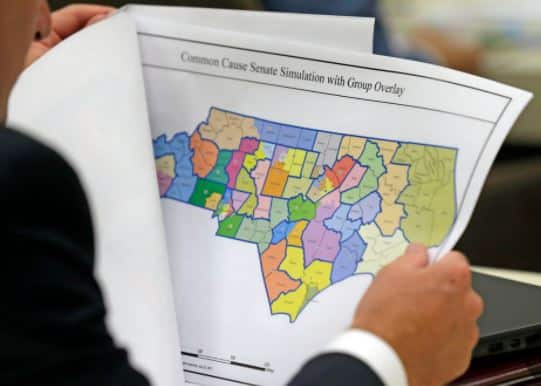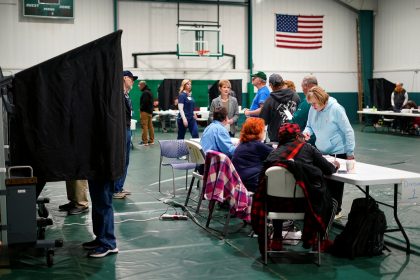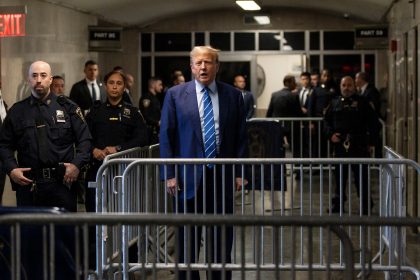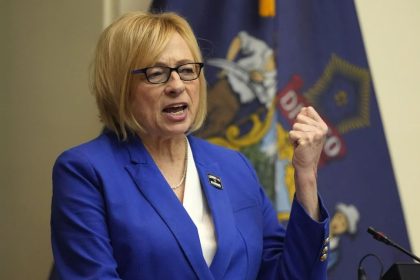North Carolina Supreme Court Expected to Rule Soon on Redistricting Challenge

RALEIGH, N.C. — The North Carolina Supreme Court on Wednesday waded into the state’s high profile dispute over partisan gerrymandering, a case likely to influence the outcome of state and congressional races across the state for the next decade.
At issue are new political district maps drawn by Republican lawmakers last year based on data from the 2020 census.
Critics of the maps contend that by packing Democrats into just a few districts around the cities of Raleigh and Charlotte, partisan mapmakers have all but ensured the GOP will retain control of the state legislature through at least 2030, and likely hold 10 of the state’s 14 seats in the U.S. House of Representatives during the same period.
An independent analysis by the nonpartisan FiveThirtyEight website came to roughly the same conclusion, finding that most of the congressional districts were red, favoring Republicans by 16 to 20 percentage points.
The map does have one competitive district, which is currently represented by Democrat G.K. Butterfield, but the margin, favoring a Democrat, is just one percentage point.
As for the three, much smaller districts favoring Democrats — two encompassing Raleigh and the third, the city of Charlotte — members of the party are favored by as much as 45 percentage points over possible Republican challengers.
But opponents of the maps say findings like these tell only part of the story. They contend that even if Democrats had a good year in North Carolina and won the statewide vote handily, the outcome for Republican candidates would likely remain unchanged.
Last month, a bipartisan three-judge panel unanimously ruled that the state and congressional district maps were unquestionably pro-Republican gerrymanders.
At the same time, however, they concluded it is not at all clear whether the North Carolina constitution prohibits such activity.
Time for a final determination of the matter is of the essence.
Currently, the North Carolina primary is scheduled for May 17. To keep that schedule, candidates wishing to run for office would need to start filing their paperwork by the end of February.
That means if the Supreme Court decides to toss the maps, it will have to do so in a matter of days, so candidates will know what districts they’re filing to run in.
Attorneys for GOP Embrace Lower Court Ruling
During Wednesday morning’s hearing, Phil Strach, an attorney for the Republican lawmakers, essentially picked up where the lower court left off, arguing that no matter what the intent of the lines on the maps, there’s nothing in the state constitution that prohibits partisan gerrymandering.
Without that, he said, the state Supreme Court arguably has no jurisdiction over the dispute.
And even if it is determined the court has jurisdiction, there would still be the matter of determining “a line between what’s permissible or impermissible” which he went on to describe as an almost impossible task.
Zach Schauf, a lawyer for the North Carolina League of Conservation Voters, one of the entities challenging the maps, didn’t push back directly at Strach’s argument, instead preferring to frame the dispute between the parties in terms of electoral fairness.
How could it be, he asked, that one party — the Democrats — might win statewide and not make any gains in terms of congressional or House seats?
“This is the systematic destruction of majority rule,” Schauf said. “The party that wins more votes should have at least a fighting chance to win most of the seats.”
As the lawyers plead their cases, seven justices — four of them Democrats, three Republicans — fired off a barrage of questions.
Justice Anita Earls, who was a Democratic civil rights attorney before her election to the bench, suggested that the state constitution’s equal protection clause should protect people on the basis of party affiliation much as it protects people on the basis of race.
If that standard were applied here, the new maps would have to be shredded, as the equal protection clause would expressly forbid lawmakers from diluting voting power by dividing people from one party into districts where their candidates can’t win.
In answer to one question, Stanton Jones, an attorney for another group of map challengers, boiled his case down to a single sentence.
“It is fundamentally unfair for legislators to rig the maps, to dilute the electoral influence and voting power of North Carolina voters,” he said.
This prompted a tart response from Chief Justice Paul Newby, a Republican, who noted that while the state constitution guarantees free elections, it says nothing about fair elections.
Newby also questioned the statistical basis used to “determine” how a given district might vote based on past election results.
To Newby, it seemed, the arguments against the maps stripped the voter of his or her humanity, assuming they’ll vote for Republicans or Democrats simply because that’s how they are registered.
According to the chief justice, this reasoning ignored the fact there could be many other reasons a voter might pick a particular candidate as their preference.
If the plaintiffs want the maps overturned, he said, “the court has got to have a clear standard that we can give the general assembly … otherwise, we’re simply making it up.”
The court adjourned after about an hour and a half of oral arguments, but didn’t give any indication of when they’ll hand down their decision.
Following the hearing, the National Redistricting Foundation, which is supporting the North Carolina voters who joined in filing the case in November 2021, issued a statement in which it said, “The North Carolina Supreme Court now has everything it needs to definitively strike down the state’s new congressional and state legislative district maps as extreme partisan gerrymanders that violate the state constitution.”
Issued under the name of Marina Jenkins, director of litigation and policy for the NRF, the statement went on, “North Carolina is a highly competitive state, yet Republicans attempted to pack and crack their way into unchecked power by diminishing the votes of the state’s most populous and diverse communities.
“That simply does not comport with the constitutional protections provided to North Carolina voters. We look forward to hearing a final decision from the Supreme Court soon,” Jenkins said.
Dan can be reached at [email protected] and at https://twitter.com/DanMcCue
























